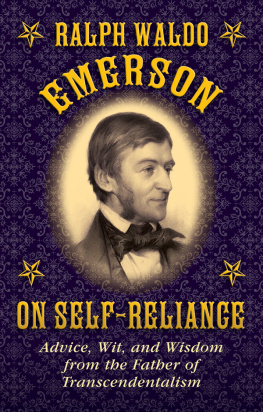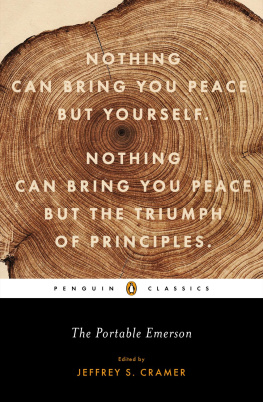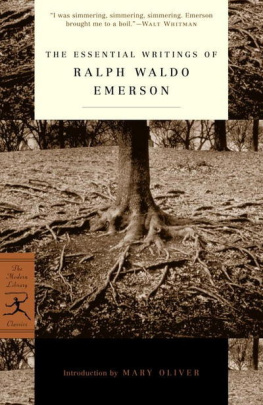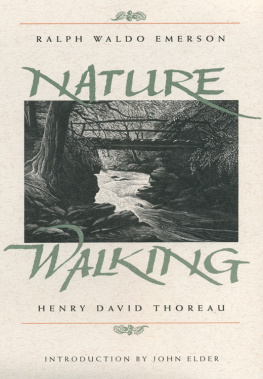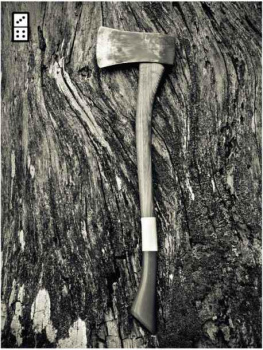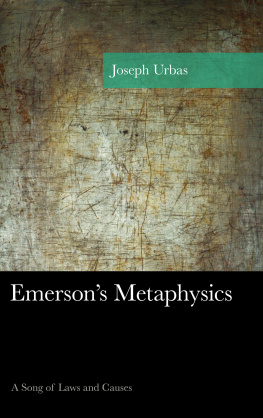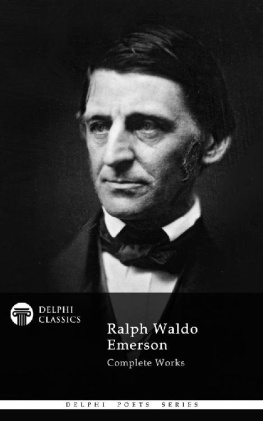Ralph Waldo Emerson - Essential Writings of Ralph Waldo Emerson
Here you can read online Ralph Waldo Emerson - Essential Writings of Ralph Waldo Emerson full text of the book (entire story) in english for free. Download pdf and epub, get meaning, cover and reviews about this ebook. year: 2000, publisher: Random House Publishing Group, genre: Science. Description of the work, (preface) as well as reviews are available. Best literature library LitArk.com created for fans of good reading and offers a wide selection of genres:
Romance novel
Science fiction
Adventure
Detective
Science
History
Home and family
Prose
Art
Politics
Computer
Non-fiction
Religion
Business
Children
Humor
Choose a favorite category and find really read worthwhile books. Enjoy immersion in the world of imagination, feel the emotions of the characters or learn something new for yourself, make an fascinating discovery.

- Book:Essential Writings of Ralph Waldo Emerson
- Author:
- Publisher:Random House Publishing Group
- Genre:
- Year:2000
- Rating:3 / 5
- Favourites:Add to favourites
- Your mark:
- 60
- 1
- 2
- 3
- 4
- 5
Essential Writings of Ralph Waldo Emerson : summary, description and annotation
We offer to read an annotation, description, summary or preface (depends on what the author of the book "Essential Writings of Ralph Waldo Emerson " wrote himself). If you haven't found the necessary information about the book — write in the comments, we will try to find it.
Essential Writings of Ralph Waldo Emerson — read online for free the complete book (whole text) full work
Below is the text of the book, divided by pages. System saving the place of the last page read, allows you to conveniently read the book "Essential Writings of Ralph Waldo Emerson " online for free, without having to search again every time where you left off. Put a bookmark, and you can go to the page where you finished reading at any time.
Font size:
Interval:
Bookmark:
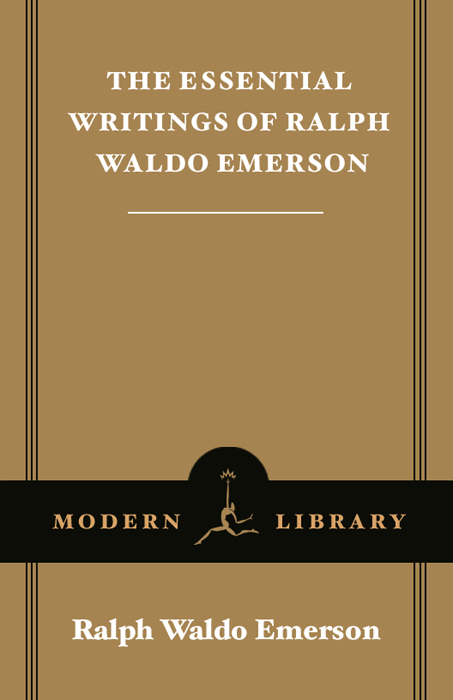
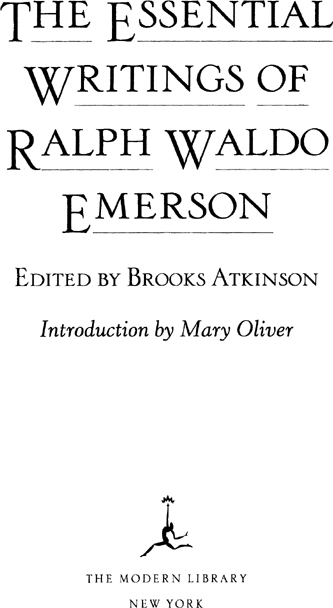
Ralph Waldo Emerson was born on May 25, 1803, in Boston, Massachusetts. At Harvard he won prizes for his oratory and essays. He studied briefly at Harvard Divinity School but was forced to interrupt his courses because of eye trouble. In 1826 he began a career as a minister, eventually becoming junior pastor of the Second Church of Boston. He married Ellen Tucker in 1829, despite the fact that she was already ill with tuberculosis; she died two years later at the age of nineteen.
After the death of his wife, Emerson went to Europe, where he met Landor, Mill, Coleridge, Wordsworth, Carlyle, and others. On his return he settled in Concord, Massachusetts, and a year later married Lydia Jackson. What would eventually be called the Transcendental Club had begun to form around him, its members including Margaret Fuller, Bronson Alcott, and Orestes Brownson. The spiritual ferment of the Concord group found expression in Emersons first significant work, the essay Nature (1836), in which he sketched the ideas that his later writings were to elaborate: The use of natural history is to give us aid in supernatural history: the use of the outer creation, to give us language for the beings and changes of the inward creation. By degrees we may come to know the primitive sense of the permanent objects of nature, so that the world shall be to us an open book, and every form significant of its hidden life and final cause. This was followed by two profoundly influential orations, The American Scholar, a powerful statement of individualism, and The Harvard Divinity School Address, whose unorthodox religious views created a scandal: Historical Christianity has fallen into the error that corrupts all attempts to communicate religion. It has dwelt, it dwells, with noxious exaggeration about the person of Jesus. The soul knows no persons.
Around this time Emerson became closely associated with Henry David Thoreau and with the mystical poet Jones Very. He gave up preaching and collaborated with Margaret Fuller on the journal The Dial, in which he began to publish his essays. These appeared in book form as Essays: First Series (1841) and Essays: Second Series (1844). He became more involved in political issues, launching attacks on the Mexican War and slavery His essays had made him an internationally known figure, and on a return trip to Europe in 1847 he met with a wide range of writers and thinkers, including Dickens, Tocqueville, and Tennyson. He published further collections of his essays and public addressesNature, Addresses, and Lectures (1849), Representative Men (1850), English Traits (1856), The Conduct of Life (1860)while lecturing against slavery throughout the Northeast. Whitmans Leaves of Grass elicited an enthusiastic response from him, although he attempted to persuade the poet to tone down the poems sexual imagery
Following the Civil War, Emerson continued to lecture energetically, publishing Society and Solitude (1870) and the verse collection May-Day and Other Pieces (1867). In 1872 his health began to fail, and after a final trip to Europe he settled into a quieter routine as his memory gradually weakened. He died in Concord, of pneumonia, on April 27, 1882.
T HE DISTINCTION and particular value of anything, or any person, inevitably must alter according to the time and place from which we take our view. In any new discussion of Emerson, these two weights are upon us. By time, of course, I mean our entrance into the twenty-first century; it is almost two hundred years since Emersons birth in Boston. By place, I mean his delivery from the town of Concord, and his corporeal existence anywhere. Now he is only within the wider, immeasurable world of our thoughts. He lives nowhere but on the page, and in the attentive mind that leans above that page.
This has some advantage for us, for he is now the Emerson of our choice: he is the man of his own timehis own historyor he is one of the mentors of ours. Each of these possibilities has its attractions, for the man alive was unbelievably sweet and, for all his devotion to reason, wondrously spontaneous. Yet as times passage has broken him free of all mortal events, we begin to know him more clearly for the labors of his life: the life of his mind. Surely he was looking for something that would abide beyond the Tuesday or the Saturday, beyond even his first powerful or cautionary or lovely effect. The office of the scholar, he wrote in The American Scholar, is to cheer, to raise, and to guide men by showing them facts amidst appearances. The lofty fun of it is that his appearances were all merely material and temporalbrick walls, garden walls, ripening pearswhile his facts were all of a shifty vapor and an unauthored goodwill: the luminosity of the pears, the musics of birds and the wind, the affirmative staring-out light of the night stars. And his belief that a mans inclination, once awakened to it, would be to turn all the heavy sails of his life to a moral purpose.
T HE STORY of his life, as we can best follow it from its appearances, is as follows. Ralph Waldo Emerson was born in 1803; his father, William Emerson, died in 1811. The familyhis mother, two sisters, and five brotherswere poor, devout, and intellectually ambitious. Deaths fast or slow lightning was a too-frequent presence. Both girls and one boy died in childhood; Emersons brothers William, Edward, and Charles survived only into early manhood. The only remaining brother was Robert, who was a man of childish mind. As the poet Walt Whitman for most of his life took responsibility for his child-minded brother, Eddie, so did Emerson keep watch over this truculent survivor.
Emerson graduated from Harvard College, then divinity school, and in 1829 he began preaching at the Second Church (Unitarian) in Boston. In that year he married the beautiful but frail Ellen Tucker. Her health never improved, and in 1832 she died. Emerson was then twenty-nine years old.
I think it is fair to say that from this point on, the greater energies of his life found their sustenance in the richness and steadfastness of his inner life. Soon after his wifes death he left the pulpit. He had come to believe that the taking of the sacrament was no more, nor was meant to be more, than an act of spiritual remembrance. This disclosure he made to his congregation, who perhaps were grateful for his forthrightness but in all honesty did not wish to keep such a preacher. Soon after, Emerson booked passage to Europe. He traveled slowly across the Continent and, finally, to England. He was deeply touched by the magnificence of the past, so apparant in the cities, in their art and architecture. He also made it his business to explore the present. The list of those he met and talked with is amazing: Coleridge, Wordsworth, Walter Savage Lander, John Stuart Mill among them. His meeting with Thomas Carlyle began a lifelong friendship, their letters going back and forth across the Atlantic until Emersons death.
Emerson returned from Europe and established a manner of living that he would scarcely alter for the rest of his life. He married again, a young woman named Lydia Jackson. In his journals, which he had begun in college and never abandoned, he tore down wall after wall in his search for a style and for ideas that would reach forth and touch both poles: his certainty and his fluidity. He bought a house in the town of Concord, an easy distance from Boston yet a place with its own extraordinary style and whose citizens were farmers, tradesmen, teachers, and the liveliest of Utopians. Here, as husband and father, as writer and lecturer, Emerson would live for years his seemingly quiet, seemingly peaceful life.
Font size:
Interval:
Bookmark:
Similar books «Essential Writings of Ralph Waldo Emerson »
Look at similar books to Essential Writings of Ralph Waldo Emerson . We have selected literature similar in name and meaning in the hope of providing readers with more options to find new, interesting, not yet read works.
Discussion, reviews of the book Essential Writings of Ralph Waldo Emerson and just readers' own opinions. Leave your comments, write what you think about the work, its meaning or the main characters. Specify what exactly you liked and what you didn't like, and why you think so.

